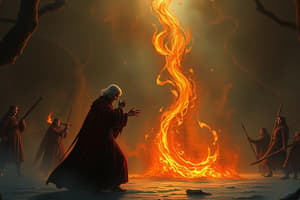Podcast
Questions and Answers
What do the three witches refer to in the opening scene?
What do the three witches refer to in the opening scene?
- A storm (correct)
- A feast
- A battle (correct)
- Peaceful times
Who informs King Duncan about Macbeth's bravery in battle?
Who informs King Duncan about Macbeth's bravery in battle?
An army captain
Banquo warns Macbeth about the witches' prophecies.
Banquo warns Macbeth about the witches' prophecies.
True (A)
What becomes of the previous Thane of Cawdor?
What becomes of the previous Thane of Cawdor?
The witches predict Macbeth will be 'Thane of Cawdor' and '______ hereafter.'
The witches predict Macbeth will be 'Thane of Cawdor' and '______ hereafter.'
What is the theme introduced in Act I Scenes 1-4 related to the witches' words?
What is the theme introduced in Act I Scenes 1-4 related to the witches' words?
Match the following key quotes to their themes:
Match the following key quotes to their themes:
What do the witches predict for Macbeth?
What do the witches predict for Macbeth?
Macbeth is portrayed as a loyal soldier to King Duncan in Act I Scene 1.
Macbeth is portrayed as a loyal soldier to King Duncan in Act I Scene 1.
What key themes are introduced in Act I Scenes 1–4?
What key themes are introduced in Act I Scenes 1–4?
In Act I, Scene 2, Macbeth fights ruthlessly because he ‘________’ their enemy, Macdonald.
In Act I, Scene 2, Macbeth fights ruthlessly because he ‘________’ their enemy, Macdonald.
Who warns Macbeth about the witches?
Who warns Macbeth about the witches?
The previous Thane of Cawdor was executed for his loyalty to King Duncan.
The previous Thane of Cawdor was executed for his loyalty to King Duncan.
What does King Duncan name Malcolm as?
What does King Duncan name Malcolm as?
Which quote reflects the theme of appearance and reality?
Which quote reflects the theme of appearance and reality?
How does Macbeth feel about needing to 'o’erleap' Malcolm?
How does Macbeth feel about needing to 'o’erleap' Malcolm?
Flashcards are hidden until you start studying
Study Notes
Act I Scenes 1–4
- The play begins with three witches in a storm.
- The witches are using dark and mysterious language suggesting violent conflict.
- We are introduced to Macbeth, a brave and loyal soldier.
- Macbeth is described as a ruthless fighter who ‘unseamed’ an enemy.
- The witches predict Macbeth will be Thane of Cawdor, and King hereafter.
- Banquo is told by the witches his sons will be kings.
- Macbeth is given the title of Thane of Cawdor by King Duncan as a reward for his loyalty and courage.
- Banquo warns Macbeth about the witches, as he believes they sometimes tell truths to cause harm.
- The previous Thane of Cawdor was executed for betrayal.
- King Duncan informs the court his eldest son, Malcolm, will become the next king.
- Macbeth is fueled by ambition, as he recognizes he would have to 'o’erleap' Malcolm to become king.
- The theme of 'appearance and reality' is introduced by the witches: 'Fair is foul, and foul is fair'.
Act I Scenes 1 - 4
- The play opens with three witches in a storm.
- Macbeth and Banquo are brave warriors who are loyal to King Duncan.
- Key themes are introduced:
- the supernatural
- ambition
- violent conflict
- appearance vs reality.
- The witches arrange to meet Macbeth. They foreshadow conflict.
- Macbeth's bravery is highlighted. He killed Macdonald ruthlessly, severs his head and displays it on a battlement.
- The witches predict Macbeth will be Thane of Cawdor and King. Banquo's sons will also be kings.
- Duncan rewards Macbeth by making him Thane of Cawdor.
- Banquo cautions Macbeth about the witches, suggesting they might be manipulating Macbeth for their own gain.
- The previous Thane of Cawdor committed treason, and was executed.
- Duncan names Malcolm, his eldest son, as his heir.
- Macbeth is conflicted as he contemplates his future, knowing that he will need to usurp Malcolm to achieve his ambition.
- Quotes:
- "Fair is foul, and foul is fair" (witches) (I.1.12) - this sets the scene for the play, highlighting the duality between appearance and reality.
- "For brave Macbeth – well he deserves that name” (Captain) (I.2.16) - Macbeth's bravery is established early on.
- "his brandish’d steel,/Which smok’d with bloody execution” (Captain) (I.2.16–17) - This reveals Macbeth's ruthless nature, emphasising his violent methods in battle.
- "Stars, hide your fires,/Let not light see my black and deep desires” (I.4.50–1) - Macbeth's internal struggle with his ambition is hinted at in this quote.
Studying That Suits You
Use AI to generate personalized quizzes and flashcards to suit your learning preferences.




